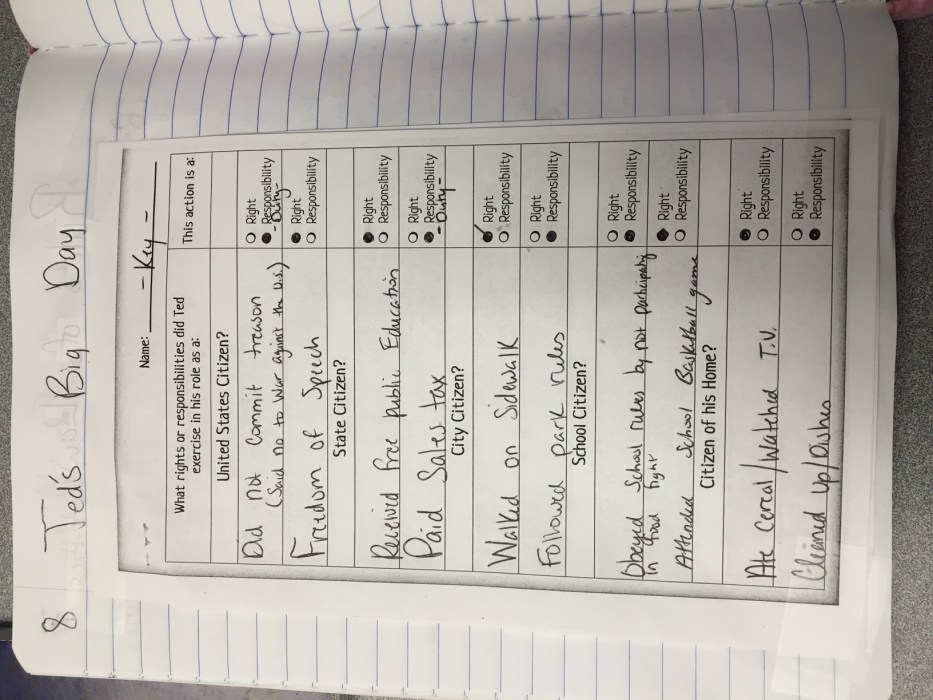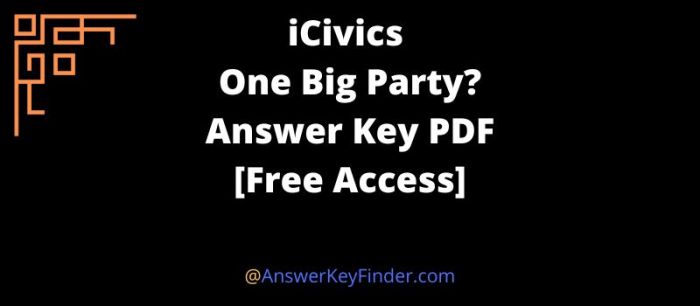The One Big Party iCivics Answer Key PDF delves into the intricate world of one-party systems, providing a comprehensive overview of their historical evolution, political implications, and impact on democratic governance. This analysis offers a valuable resource for educators, students, and anyone seeking a deeper understanding of this complex political phenomenon.
One-party systems have existed throughout history, shaping the political landscapes of nations worldwide. They offer distinct advantages, such as stability and efficiency, but also pose potential challenges to democratic principles, including limited political choice and suppression of dissent. This analysis examines these systems from multiple perspectives, shedding light on their complexities and implications for modern-day politics.
One-Party Systems: Definition and Overview

In the context of American politics, “one big party” refers to a hypothetical scenario where one political party dominates the political landscape, effectively eliminating meaningful competition from other parties.
Historically, one-party systems have existed in various forms around the world, including communist regimes, dictatorships, and autocracies. Examples include the former Soviet Union, China under Mao Zedong, and North Korea under the Kim dynasty.
Potential advantages of a one-party system include political stability, efficient decision-making, and a clear ideological direction. However, it also raises concerns about limited political choice, suppression of dissent, and the erosion of civil liberties.
Impact on Democracy, One big party icivics answer key pdf
One-party systems can have a profound impact on democratic principles.
Limited political choice is a major concern, as citizens have fewer options to express their political views and preferences. This can lead to a lack of representation and a disconnect between the government and the people it governs.
Suppression of dissent is another potential issue. In one-party systems, dissenting voices may be silenced or marginalized, resulting in a lack of open and critical debate.
Furthermore, civil liberties may be eroded as the ruling party consolidates power. This can include restrictions on freedom of speech, assembly, and the press.
Case studies of countries that have transitioned from one-party systems to multi-party democracies, such as Poland and South Africa, provide valuable insights into the challenges and opportunities involved in such transitions.
Implications for Policymaking
One-party systems can significantly affect policymaking processes.
Lack of accountability is a concern, as the ruling party may face limited pressure to respond to public opinion. This can lead to stagnation and a lack of responsiveness to the needs of the people.
Examples of how one-party systems have influenced policy outcomes include the implementation of centrally planned economies in communist regimes and the suppression of environmental regulations in autocratic regimes.
Role of Civic Education
Civic education plays a crucial role in fostering informed participation in a one-party system.
Critical thinking skills are essential for citizens to analyze political information and make informed decisions.
Media literacy is important for citizens to critically evaluate media content and identify potential biases or misinformation.
Understanding political ideologies is vital for citizens to comprehend the different perspectives and values that shape political discourse.
Effective civic education programs that promote political engagement and accountability can help mitigate the potential negative consequences of one-party systems.
Frequently Asked Questions: One Big Party Icivics Answer Key Pdf
What is the definition of a “one big party” system?
A one-party system is a political system in which a single political party has the dominant or exclusive control over the government.
What are the potential advantages of a one-party system?
One-party systems can offer stability, efficiency, and a clear direction for policymaking.
What are the potential disadvantages of a one-party system?
One-party systems can limit political choice, suppress dissent, and erode civil liberties.
How does a one-party system impact policymaking?
One-party systems can lead to a lack of accountability, stagnation, and limited responsiveness to public opinion.
